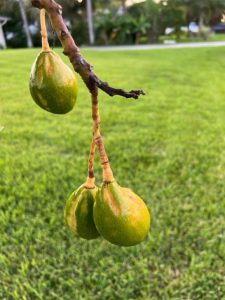Recently, Collier County Extension received an email about strange looking spots on an avocado fruit. A sample was submitted to the UF/IFAS Tropical Research and Education Center Plant Diagnostic Clinic to figure out exactly what was causing the deformation.
The TREC-PDC serves farmers, greenhouse producers, homeowners, nurseries, and others in agriculture and the green industries to diagnose pest and disease issues with a specific area of expertise in tropical plants, trees and fruit diseases.
From observation, testing, and lack of other pathogens (bacteria or fungi) found on the fruit, the most likely diagnosis is was, yes, this is Avocado sunblotch viroid (ASBV).
What is ASBV?
ASBV is a systemic disease meaning, it infects the entire tree from roots to leaves. The viroid particles can be spread from tree to tree through root-grafts, buds, seeds, pruning, dirty equipment, pollen, and is persistent. There are no cultivars of avocados that are resistant.
What do Symptoms look like?
Symptoms can vary from tree to tree. The more obvious signs of viroid infection include sunken or depressed yellow, white or red patches, streaks, or spotting. Branches and leaves can also have some distortion and discoloration. Significant decrease in fruit yields is also documented. Trunks and larger branches can form cracking on the bark, called “alligator bark”. And sometimes, a tree can present no symptoms at all but are still carriers, which is sometimes how the viroid is introduced into a grove.

Control
Unfortunately, there is no control or treatment for this disease. Infected trees should be destroyed. You should also take care to practice good management in the grove. This include regularly cleaning and sanitizing pruning and propagation tools, removing infected plants, stumps and plant tissues to prevent disease spread, and purchasing trees from certified nurseries.
Can I eat the fruit?
ASBV infection reduces fruit quality and fruit yield. Fruits are edible and safe to eat, but the fruit may not fully ripen or even taste very good.
Where can I get more information?
You can find more information on Avocado sunblotch viroid here: https://www2.ipm.ucanr.edu/agriculture/avocado/sunblotch/
Avocado sunblotch viroid educational video from UF/IFAS:https://plantpath.ifas.ufl.edu/misc/plant-virus-profiles/Viroid/Avocado%20sunblotch%20viroid/
 0
0
